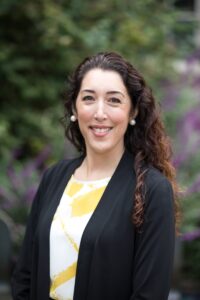Post Author: Roxanne Almas, MD, MSPH

Roxanne Almas is a developmental behavioral pediatrician and an associate professor of pediatrics at UCSF Benioff Children’s Hospital, specializing in children with complex neurodevelopmental conditions. She also serves as the wellness coordinator for the Division of Developmental Medicine at UCSF. Fluent in French and proficient in Spanish, she centers whole-person care that honors trauma, equity, and family partnership. Certified as a narrative medicine and yoga nidra facilitator, she explores how storytelling and rest support resilience and healing in health care. She leads UCSF’s Narrative Medicine Circles, conducts workshops nationally, and was selected as a writer for the Breathe: Honoring the Voices of Healthcare film series. Her writing appears in Bioethics Today and KevinMD. Outside of work, she enjoys writing, gardening, and finding the sacred in the everyday.

Roxanne Almas is a developmental behavioral pediatrician and an associate professor of pediatrics at UCSF Benioff Children's Hospital, specializing in children with complex neurodevelopmental conditions. She also serves as the wellness coordinator for the Division of Developmental Medicine at UCSF. Fluent in French and proficient in Spanish, she centers whole-person care that honors trauma, equity, and family partnership. Certified as a narrative medicine and yoga nidra facilitator, she explores how storytelling and rest support resilience and healing in health care. She leads UCSF's Narrative Medicine Circles, conducts workshops nationally, and was selected as a writer for the Breathe: Honoring the Voices of Healthcare film series. Her writing appears in Bioethics Today and KevinMD. Outside of work, she enjoys writing, gardening, and finding the sacred in the everyday.
I didn’t realize how exhausted I was until everything stopped. First came burnout, the quiet unraveling so many physicians know too well. Then grief followed. I lost my mother unexpectedly to an aggressive cancer and, three years later, my father after years of caregiving through advanced Parkinson’s disease. These losses shattered not only my heart but the way I viewed my life and work. For years, I practiced medicine within …
Read more…
I spend most of my working hours trying to unlock superpowers. When I chose to pursue medicine—pediatrics, and later, developmental behavioral pediatrics—I didn’t realize I would be learning to decode languages. These languages aren’t always spoken, yet over time, I’ve developed a sharp instinct for reading them. Every time I step into an exam room, my task is to slowly unravel how a child sees the world, communicates with it, …
Read more…
Making a bed seems to be a lost art these days, an unassuming ritual. I have memories of my mother draping, folding, laying, and spreading sheets as they danced in her open-air bedroom. My grandmother passed on the technique to her. From my observations of other families, this practice varies from generation to generation. In a way, making a bed symbolizes life’s journey, where the layers of sheets represent rich …
Read more…
As a pediatric subspecialist in the division of developmental medicine at our hospital and a mother of two school-aged children, I constantly strive to find new approaches to both parenting and my medical practice. Some of these strategies work well, while others do not. Despite my attempts to believe that my roles as a pediatrician and a parent do not influence each other, the truth is that they are deeply …
Read more…
The silence felt heavy on the other end of the phone line. I waited a few seconds, and it dawned on me: He wasn’t ready. This moment, each in our own worlds was a defining point in our journey.
Twenty seconds earlier, I had just shared the following with him, “We are ready for hospice.” But he clearly wasn’t. Or maybe he was and just couldn’t verbalize it. He paused after …
Read more…
I sifted through both cars, my own and my husband’s, underneath our boys’ baseball equipment, candy wrappers, and empty water bottles. The felt bag was nowhere to be found.
I was finally ready to take this bag of a dozen sweaters, some of which were my fancy cashmeres, to the dry cleaners. Why a dozen, you may ask? Well, these were essentially all the nice sweaters I owned. I waited a …
Read more…
For the last couple of decades, I was trained to save lives. I sat shoulder to shoulder with others who drilled this in me when I was green, sometimes even through humiliation. I learned to perceptively read patient cues, develop quick reflexes, and think on the spot in critical moments, wherever and whenever life was compromised. I always threw lifebuoys into the ocean when I was called into action. This …
Read more…








![AI censorship threatens the lifeline of caregiver support [PODCAST]](https://kevinmd.com/wp-content/uploads/Design-2-190x100.jpg)
